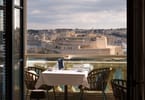NEW YORK – Conde Nast Traveler announced the winners of the magazine’s fifth annual World Savers Awards, honoring travel companies from around the world for their leadership in social responsibility in six key areas: education, health, poverty, preservation, wildlife, and “doing it all.”
In a recent poll of Conde Nast Traveler readers, 93 percent thought travel companies should be responsible for protecting the environment, while 58 percent said their choice of hotel is influenced by the support it gives to the local community. Six percent said that more than two days was an ideal length of time to volunteer while on vacation, and 44 percent thought a half-day would be sufficient. The good news is that the World Savers Awards offer up opportunities for vacations where you can relax on your holiday in luxury, feeling at peace in the knowledge that the money you are spending is helping to support worthy acts of global citizenship.
The 2011 World Savers Awards Winners:
Education: Guludo Beach Lodge
Located on the white sandy beaches of Mozambique, this hyper-secluded getaway has leveraged upscale travel to change the lives of 15,000 Mozambicans by giving them access to clean water when they never had it before. They also provide school meals for 800 children, have distributed 9,000 mosquito nets, have built two new primary schools, and have provided 162 secondary school scholarships.
Health: Accor
This Euro-chic hotel chain (which includes the brands Sofitel and Novotel) has 4,200 properties in 90 countries and is helping to fight AIDS in Africa, has trained more than 10,000 employees to recognize and report pedophiles to the authorities to fight child trafficking, and encourages guests to save water—for every five towels guests reuse, the company plants one tree.
Poverty: Spier
An elegant farmstead on a wildlife reserve set in South African wine country has created a self-sustaining ecosystem and economy whose guests receive a lesson in wastewater management. The hotel also pays employees more than 30 percent above what the law requires, with a goal for all workers to afford access to health care as well as education for their families, and enabled 13 previously disenfranchised farmers to rent land directly from the government.
Preservation: Banyan Tree
All 29 of their hotel properties, set in unusual Asian locales and Mexico’s Caribbean and Pacific coasts, operate in harmony with cultural heritage and the environment. The parent company committed in 2007 to plant 2,000 trees per year for ten years and has planted more than 96,000 to date.
Wildlife: Lindblad Expeditions
The company offers small-ship trips for adventurers who like their comforts. The ships carry scientists and guests into environmentally fragile places (the Galapagos Islands, the Arctic, the Amazon, etc.) to inspire—and institute—conservation.
Wildlife: Wolgan Valley Resort & Spa
This eco-friendly resort and spa is located in the Australian bush and has reintroduced decimated plant species, strives to be carbon neutral (using some 100 solar panels as well as windmills to pump water), and has protected small marsupials by establishing a “feral-free” habitat.
Overall Winners for “Doing It All,” by Industry Category:
Airline: Lufthansa
Cruise Line: Celebrity Cruises
City Hotel: Grand Hyatt Sao Paulo, Brazil
Small Hotel Chain: Six Senses, Asia
Tour Operator: Abercrombie & Kent
Large Resort: Spier, South Africa
Small Resort: Guludo Beach Lodge, Mozambique
Large Hotel Chain: Accor
WHAT TO TAKE AWAY FROM THIS ARTICLE:
- This Euro-chic hotel chain (which includes the brands Sofitel and Novotel) has 4,200 properties in 90 countries and is helping to fight AIDS in Africa, has trained more than 10,000 employees to recognize and report pedophiles to the authorities to fight child trafficking, and encourages guests to save water—for every five towels guests reuse, the company plants one tree.
- An elegant farmstead on a wildlife reserve set in South African wine country has created a self-sustaining ecosystem and economy whose guests receive a lesson in wastewater management.
- The hotel also pays employees more than 30 percent above what the law requires, with a goal for all workers to afford access to health care as well as education for their families, and enabled 13 previously disenfranchised farmers to rent land directly from the government.






















